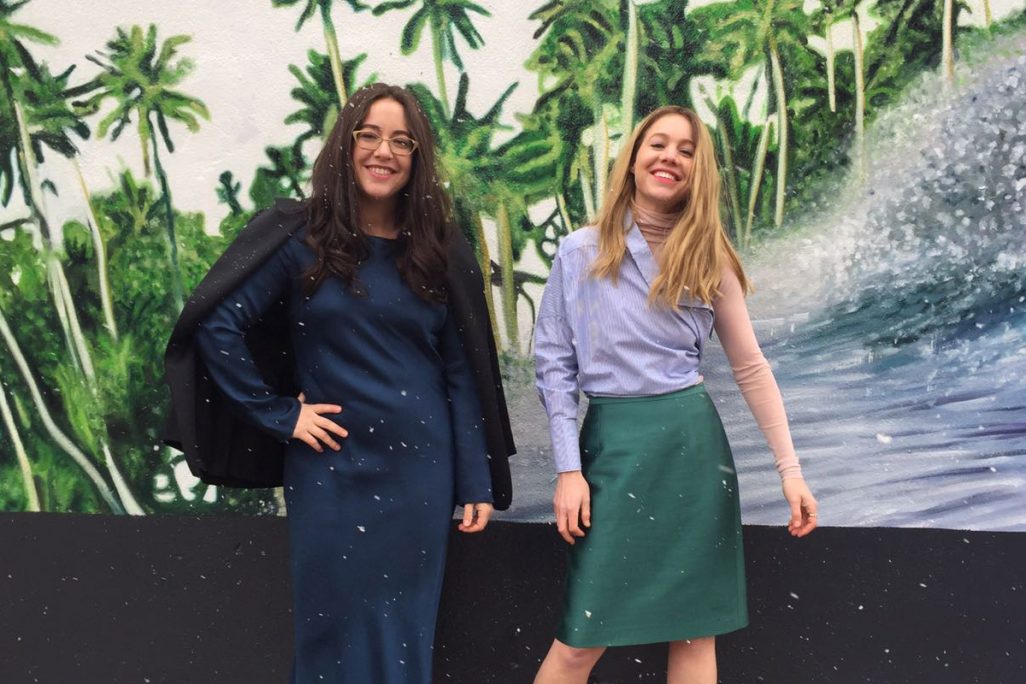Sisters Simi Polonsky and Chaya Chanin, orthodox Haredi fashion designers from Brooklyn, New York have created a modest and cool fashion brand winning the hearts of the Haredi world, called The Frock NYC. “We want to create a revolution in the fashion world. We want to prove that modest clothing does not have to be greyish and boring, but can be colorful and young and cool,” says Simi. “As religious and believing Jewish women, we felt a need to create clothing that would suit us, and therefore combine modest clothing as is customary in Jewish culture and society, in accordance with our personal faith and wishes, with the ability to dress boldly and colorfully, in a
unique way just like we always wanted to,” Chaya adds.
Simi and Chaya Gestetner’s (their maiden name) unique attitude towards fashion developed sometime during their childhood in an Australian coastal town, as daughters to a Chabad community Rabbi. “I remember Simi at age five, not willing to wear the dress that our mother gave her to wear,” says Chaya. “We always wanted to dress boldly, and during our adolescence it became a game – to try to combine acceptable traditional dress in the home and the community with our desire to stand out and dress like young women in Australia.” The attempt to combine these two elements is very clear from the pair’s designs, which include many dresses, most of which cover the shoulders and knees, but also include hot trendy elements from the fashion world, expressed in colors and innovative cuts. “Many of our designs today are dresses and clothes that we dreamed of wearing when we were little and now we have the privilege and ability to make them,” they add. “We are very proud of the place we have reached – Haredi Chabad girls in Australia to establishing an independent and thriving women’s business. We did not grow up in a house which directed us towards business and financial thinking, and we are very happy that we have succeeded in advancing and creating this wonderful thing together.”
Chaya and Simi emphasize that their success is connected to the way they were raised, to their family’s positive attitude towards the profession they chose, and specifically to the men in their lives. “A lot of people think that our father doesn’t allow or support what we’re doing but it’s just the opposite. If there was an award for the coolest Rabbi – our dad would definitely win. Growing up, there were a lot of different people in our house – both Jews and non-Jews – and we were always taught to respect and accept everyone. Our husbands are also very supportive of us,” Simi adds, “Aside from the fact that my husband gets mad that I’m on the phone all the time and he tells me to put it down. I tell him that it’s a work matter and say, ‘You don’t want me to succeed at work?’ And then he calms down. Our partners also do a lot and give up a lot for us to manage to work. Sometimes it means being at the office until late, and they’re ok with it.”
Every woman and her own modesty
Simi and Chaya believe that modest fashion doesn’t have only one definition. “You can definitely say that we make fashion that is less revealing, but in our opinion every woman can define for herself what is considered modest to her. If you think that clothing that ends above the knee is modest, that’s great and wonderful. For example, we recently designed a tank top that can be worn with a leotard underneath, and that’s how we wear it, but if you want to wear it as a tank top, without anything underneath, go for it. Recently, we have also started wearing pants, and we’ve started designing pants.”
On the subject of Judaism, Chaya and Simi also take views without dichotomous definitions. “As daughters of a Rabbi, we are very connected to our Judaism and to Chabad. We were raised to be strong and independent women, we don’t see the need make labels. We work according to our feeling and wishes and not according to a strict rulebook that can’t be deviated right or left from.” To the question whether the clothes get approved by a Rabbi, they answer decisively, “Of course not! We do not send our clothes to be approved by Rabbis, we don’t want to force anyone or define for her what modest fashion looks like. If someone thinks she is modest then she is modest. We do sometimes consult with Rabbis and spiritual leaders about our lives, in accordance with our personal faith. We have limits that we define for ourselves. For example, we do not design dresses that show cleavage or mini-dresses, but these are limits that we set.”
“Slow fashion” with environmental awareness that brings people together
The sisters established the Frock NYC brand in 2010. In addition to the two of them, another five women work with them on production, customer service and deliveries. The clothing is sewn at a local workshop in New York. You can see examples of their clothes on their Instagram page – which they use as a kind of fashion blog – or on their website, which is also an online clothing store. The brand’s prices are higher than well-known chains – between 70 to 200 USD, but it’s important to remember that the world of “fast fashion” has gotten us used to consuming cheap clothing at the expense of the environment and the workers who make it. “It’s important to us that all of the sewing work happens close to us, so we can see everything and make sure that everything is working according to our standards. We make ‘slow fashion,’ with all of the clothing made locally. This supports the economy and creates local jobs, and that’s important to us. The clothes are meant to last more than one season and are made for different purposes – you can wear our clothes to fancy dinners and the next day wear them to the park. You don’t have to run to Zara every two weeks to get the new collection.” The environment is also important to them: “The fact that we produce locally means that the environmental damage created by the production of our clothing is lower. We also use breathable and environmentally-friendly fabrics, and try to avoid synthetic fabrics like polyester.”
Simi and Chaya’s unique approach to fashion draws a wide variety of customers. “At first, most of the customers were religious Jewish women from Brooklyn, but today they have many customers all of the world. We also have more than a few customers who are not religious and just want to wear more modest clothing and like our designs.” Another point that was important to them to note is the ability of their fashion and clothing to connect and bring people closer together. “We have a lot of Muslim women customers, who, like Jewish women, are also looking for modest clothing in accordance with their faith and tradition, which are also cool and meet their fashion sense. At events that we hold, Jewish and Muslim women meet one another around clothing, which is positive and good,” says Chaya. “The difference is not so great. We were recently at a fashion show and saw a female Muslim designer presenting there, and if I closed my eyes I could have reached the exact same design,” Simi adds.
Simi speaking at a panel about fashion and faith:
“The experience of being a woman and a mother are very much expressed in our clothing. We design according to our daily needs. It’s already an unconscious process, we just think how we would want to look when we go to the store or take our kids to daycare,” they say in response to a question about the sources of inspiration for their designs.
Even in Israel, there are more than a few customers choosing the sisters’ brand. “Five years ago we were in Israel and we did a pop-up store in the Katamon neighborhood in Jerusalem, and a lot of women came and it was very successful. Also on Instragram we have followers who send us pictures of themselves wearing our clothing in Tel Aviv and Jerusalem, and it’s fun. We love Israel, our father is a huge supporter of Israel and always raised us to love Israel. If we could, we would go to Israel again soon, but life, work and family make it difficult. We hope to come to Israel sometime and promise to tell you when we do.”








